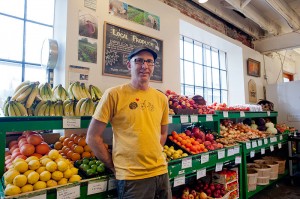By Carter Curran
Carter Curran is a senior at UVM majoring in psychology with a minor in nutrition. She wrote this piece, which uses the S.E.E.D. framework themes we feature on this blog, for an Environmental Cooking class she took this summer at UVM.
Food cooperatives are a great resource to a community. A model that sprouted during trying economic times in 18th century England, cooperative food markets now offer members and communities a wealth of positive benefits. Their effects on communities are far-reaching, influencing social, economic, environmental, and health sectors of a region with equal vigor.
From a social standpoint, food co-ops are a way of bringing communities together. They help people forge ties with their hometown and build a sense of pride and loyalty for the local community, commerce, and culture. They serve as a social meeting place, bringing people together to shop, learn, eat, and appreciate local, fair trade, and organic products. By becoming a member at your local co-op, you are given the opportunity to become part of something that is bigger than yourself. You are throwing your support behind a cause that looks out for all of its community, encourages education and innovation, and respects and wishes to protect its environment.
On an economic level, food co-ops are the best deal out there. Regardless of the gas points, member savings, and coupons other corporations circulate, the economic gains of shopping at your local food co-op really help one save. Whether it is by directly impacting grocery bills through coupons, featured deals, and annual patronage checks to members, or indirectly surging the local economy, food co-ops give back to their members and local community. As a cooperative, unlike chain grocers, the end goal is not profit! The end goal is providing members with good, wholesome foods, obtained at a reduced rate by buying together. Co-ops that buy a large percentage of their products from local vendors also positively affect the local economy. When you choose to shop at your local co-op, you are ensuring your money stays local. The indirect benefits of such a business is far-reaching and dynamic, improving the lives and futures of many.
When it comes to environmental awareness, food co-ops have a great respect for where food comes from and hold natural resources in great esteem. The importance of trying to curb destruction, make improvements, and increase education on environmental issues is a key founding principle in the mission statement of most food cooperatives. Whether by recycling, cutting down on wastes, composting, or reducing food miles, food co-ops are paving the way for environmental awareness and restoration. They supply members and local community members with a way to become more educated on environmental issues and give them direct instruction and venues to become active in the fight for environmentalism.
Food cooperatives are also looking out for people when it comes to diet and health. They are an abundant resource for health awareness, providing tips for healthy eating, recipes, and seminars focused on different nutrients, supplements, and how to buy and cook whole fresh foods. In general, food co-ops support healthier eating habits. They focus on supplying whole, fresh, local, and organic ingredients, inspiring members to adopt healthier eating habits and improve their appreciation for the art of growing, harvesting, and cooking healthy food choices. Also, when buying at co-ops, eating healthy doesn’t mean breaking the bank. Bulk sections and seasonal foods often allow shoppers to purchase healthful options while not having to make large monetary sacrifices to do so.
As consumers we sometimes forget the power that is in our hands: every person can make a difference and has the opportunity to have a positive impact on his or her community. By joining a food co-op, your purchases can reflect your positive inner values of community, local economy, environmentalism, and health. As a Vermonter, I am incredibly lucky to be at the Mecca of a food movement that is centered on healthy, sustainable, and local food. But no matter where you live, you probably have a food co-op nearby. Do your part and join a local co-op today!












